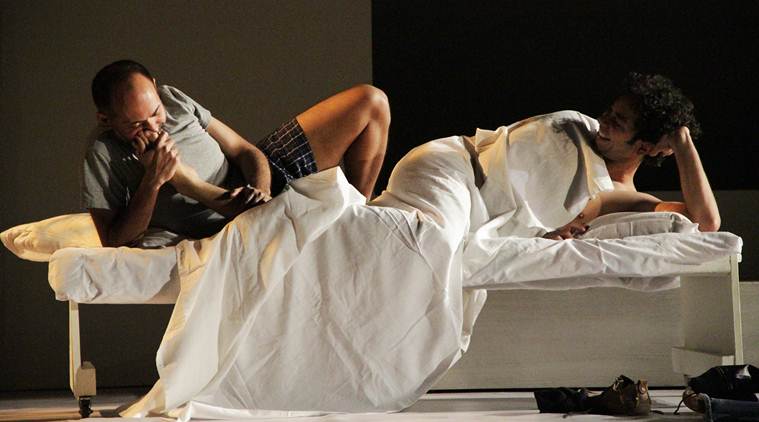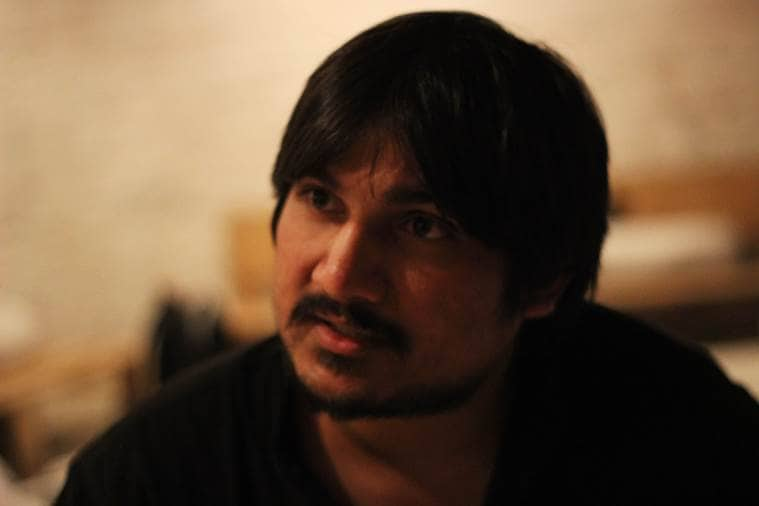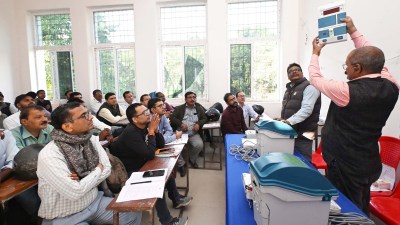Relationship status: People are at the heart of the stories and politics of Neel Chaudhuri
Neel Chaudhuri, a playwright-director at the top of his game.
 Oroon Das and Anirudh Nair in Still and Still Moving, a play about “how love in a city can be fractured”.
Oroon Das and Anirudh Nair in Still and Still Moving, a play about “how love in a city can be fractured”.
In an offbeat theatre in Delhi, all five shows of Tadpole Repertory’s new play, Quicksand, have sold out weeks before opening night. The group’s co-founder, Neel Chaudhuri, is sighted among the audience, and then he can’t be seen anymore. The other faces of Tadpole, actor-directors Bikram “Momo” Ghosh and Kriti Pant, stand out with their presence but Chaudhuri must be searched for in a crowd. Quicksand probes people’s behaviour in the era of social media, and is the first play Chaudhuri, 36, has written and directed since 2012’s critically acclaimed Still and Still Moving.
The day after the last show of Quicksand in Delhi, he opens the door of his ground-floor living room in Hauz Khas, dressed in the dark, self-effacing clothes of backstage crew. His shelves are heaped with books and LPs. There is a record player that Chaudhuri cleans and listens to every evening. “It is one of my habitual things. Most of the collection is mine, though a lot of it is inherited from my father and grandfather,” he says. This is where Chaudhuri wrote Quicksand “erratically. I don’t wake up in the morning and write for three hours”. The plot follows two strangers who have an altercation over jumping queues at an airport. The woman films him and uploads it. “It began a couple of years ago, when a lady posted a picture of a gentleman on Facebook and it went viral. What was important to me was not who was right or wrong, or did he say something abusive or was she lying? Instead, it was amazing and alarming that two people who, at 8.20 in the evening, were in their own little cocooned worlds, overnight attained a kind of celebrity that was irreversible. It had a deep-seated effect on their lives — I ended up talking to both of them — that was so interesting that it prompted me to begin working on Quicksand,” he says.
Scrolling through Chaudhuri’s Facebook page, it does not appear that he has been to a party, met an old friend or liked a cat. Traces of his existence emerge only through updates about theatre. “I have had a stand-offish relationship with social media. I was on Facebook initially and then I got off it for eight or nine years after a friend of mine died and his Facebook page became a memorial site. It disturbed me greatly,” he says. He is back to posting “because it is the best way to promote your work,” but prefers writing letters — emails — to tagging. “I am probably more private than most other people I know. I like to have aspects of my life that are available and alive to me and not open to the rest of the world. I am probably anachronistic in some ways,” he says. He speaks in long, looping sentences, every word enunciated with old-school attention to pronunciation and diction. All the while, he focuses intensely. “I am a big listener. I spend a lot of time observing people and one of the things that I think has evolved a lot in my writing is the ability to pick up an ear for the way people speak,” he says.
 Kriti Pant and Neel Sengupta in a scene from Quicksand.
Kriti Pant and Neel Sengupta in a scene from Quicksand.
In rehearsal rooms, too, Chaudhuri has discussions, allows space to others and does not impose. “He is the kind of director who expects actors to do their homework, and think for themselves,” says Ghosh. They founded Tadpole Repertory in 2009 though Chaudhuri, Ghosh and Pant had begun to make their mark together in 2007. English-language theatre in Delhi, at the time, was made up of an array of plays inspired by Western playwrights with, perhaps, a name or setting changed. Tadpole emerged as a company that took risks on stories, stagecraft and process. Oroon Das, who plays the lead in Still and Still Moving, says, “In Neel’s work, I always find that there is an authenticity which immediately helps you get into the world that he is putting out.”
Chaudhuri was brought up in Bangalore, where his parents shifted when he was very young. His father and mother had a great love for art, books and music that he inherited. His grandfather was the first cousin of Satyajit Ray, based on whose short story, Patol Babu, Film Star, Chaudhuri would write a critically acclaimed and award-winning play, Taramandal, in 2010. It was at Rishi Valley school that Chaudhuri entered theatre. “We had a weekly theatre class with a lady called Poili Sengupta, who is a playwright. I think she planted some bug in me and it has stayed,” he says. He was in Class VIII when Sunil Shanbag brought a Vijay Tendulkar play called Cyclewalla and performed it under a big banyan tree. “I remember that moment and thinking how such a thing was possible. The immersion I was feeling in that story was like magic,” he says.
At St Stephen’s College, Chaudhuri played Bottom in A Midsummer Night’s Dream. The same year, he was chosen for an Israel Horovitz play, Line, as a cocky young boy who instigates much of the trouble in the plot. “I enjoyed that because I had this reputation of being an innocent kind of guy. The director said, ‘Underneath that sweet veneer, I am going to bring out this… haraami’,” he adds.
After a Bachelor’s in history, he enrolled in Film Studies at the University of Warwick and went through the entire filmography of Ray for his dissertation. He returned to India in 2003 and worked on a number of film festivals till 2006, and plunged into the South East Asian and Asian cinema blooming at the time. A lot of the films explored ideas of time and temporality, which echo even today in Chaudhuri’s theatre. The films also gave him his love for silences.
 After a Bachelor’s in history, Neel Chaudhuri enrolled in Film Studies at the University of Warwick and went through the entire filmography of Ray for his dissertation.
After a Bachelor’s in history, Neel Chaudhuri enrolled in Film Studies at the University of Warwick and went through the entire filmography of Ray for his dissertation.
Theatre in urban India has entered a phase of politics that is stridently opposed to the right wing or one that revisits ancient mythological stories and classics, either to support sanskar or question it. Chaudhuri’s politics is covered in layers and nuances. “How do people behave, what makes them behave that way, how do they relate to each other? What changes these relationships? The politics is embedded in something else, in experience and relationship,” he says.
People are at the centre of his stories, cast against pressing events such as an unravelling of a relationship (Still and Still Moving), or irrational jealousy, and redemption (A Winter’s Tale). The former comprises vignettes of everyday scenes from the Delhi Metro, which brings far-flung areas close to the heart of the city, juxtaposed with a love affair between an older and a young man. “I didn’t want to write a play about a homosexual love affair and Section 377. I wanted to write a play about how love in a city can be fractured,” he says. A Brief History of Pantomimes (2008) would be a sharp and searing comment on attitudes towards minorities if it weren’t sheer poetry on stage about a community of people that doesn’t speak. “Our primary commitment as a theatre group is storytelling, because within that, you can do a number of things…You can do the more reflective exercises of who are we, where are we at this moment in time, where are we headed, what are our dreams, what are our nightmares,” says Chaudhuri.



- 01
- 02
- 03
- 04
- 05

























